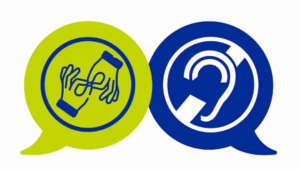Physically preparing for an assignment the night before the session is a vital part of interpreting. Having the tools for the job prepped the night before helps you eliminate obstacles to being on time. Physical preparation also helps your mental preparation: bringing you into the correct mindset to act as a professional interpreter. In this installment of our Interpreting Skills series, we will discuss what to bring to an assignment and how to prepare.

What to Bring to an Assignment
Interpreting requires more than just your skills and mindset.
Physically preparing before the session helps everything run smoothly. You should pack the night before an assignment to be sure that you have everything you need. Let’s go over some useful items to include:
-
Bag:
Your bag should be sturdy and professional–try to avoid rips and tears. A briefcase or large business tote works well but even a plain, clean, reusable canvas tote bag works too. Backpacks are acceptable but don’t look very professional.
-
Your Agency ID (and business cards):
If you’re working with an agency, you should have an ID badge to identify you as an agency interpreter. Many agencies also provide business cards. You can write your name on them so the client knows to request you in the future. If you’re working strictly independently, we highly recommend making an ID badge for yourself. This helps identify you as the interpreter: also useful for adhering to safety standards.
-
Your work order:
If you’re working with an agency, you need to bring your work order to the assignment. This allows the client to sign off on your start and end times. Having this record allows your agency to invoice the client and confirm your payment as well. If you’re working independently, you should still bring a way for the client to sign you in and out. This vastly simplifies billing and keeps an accurate record.
-
Pen/pencil and small notepad:
These are vital for taking notes during the assignment.
-
A water bottle:
This is always useful but isn’t mandatory.
-
A dictionary:
We recommend that you pick up a target-language to English dictionary. Bring it with you in case you get stuck on a word or phrase. While there are a ton of dictionary apps, clients tend to prefer that you use a physical, book dictionary. They sometimes become alarmed when you bring out your phone during sessions–even if you’re using it as your dictionary. It’s one of our most common “professionalism” complaints as an agency.
-
A cell phone:
This one’s more for before/after the assignment–but we do recommend that you carry a cellphone with you. It’s useful in case you get lost on the way and are going to be a bit late. It’s also helpful for if you’re working for an agency and need to report that the client’s extending the session. Naturally, you’d step out to make this call. Finally, a cell phone lets you report anything necessary immediately after the session. If you don’t have a cell phone, we recommend that you pick up an inexpensive, prepaid phone. You can pay only for what you need and use, but you’re still accessible.
Dressing for the Job
Must dress professionally and appropriately for the job
Most agencies don’t have a strict dress code but, you must dress appropriately. This is another part of “night before” physical preparation. Lay your clothing out to be sure it fits the session requirements. Some assignments require a little more formality: business professional dress. In any case, a good rule of thumb is “when in doubt, business casual.” This means:
- No jeans, shorts, graphic tees, hoodies, sweatpants, or sneakers
- No rips, tears, or visible stains. We do recommend considering keeping a change of clothes in the car in case you spill something (like coffee).
- If you’re wearing a skirt, please keep it knee-length at shortest
- We suggest that you bring a light blazer or sweater as sometimes interpreting assignments can take place in cold buildings.
Appropriate attire means that you look clean and professional and that you feel comfortable, too. If you’re wondering if something toes the line of appropriate, err on the side of caution. This is more than just a matter of professionalism: it’s safety, too. Particularly in mental health facilities, being dressed professionally is a matter of interpreter risk-management. Your clothing and badge immediately identifiy you as a working professional who should be pulled out of any dangerous situation. Adhering to dress standards ensures your personal safety while on the job.
Global Arena’s Interpreter Training
Interpreting is more than a job—it’s a consuming career that requires consistent preparation and education. A great way to start is to sign up for our monthly Interpreter Training Course. The course is 16 hours (spread over four days) of group discussion, practice, and information. On the last day, you’ll take an exam to receive your training certificate with a passing score. You can use this certificate for job applications and to keep track of your professional skills. You’ll also create a network of other interpreters to build your professional community. Learn more and reserve your place at the Global Arena’s Interpreter Training!




